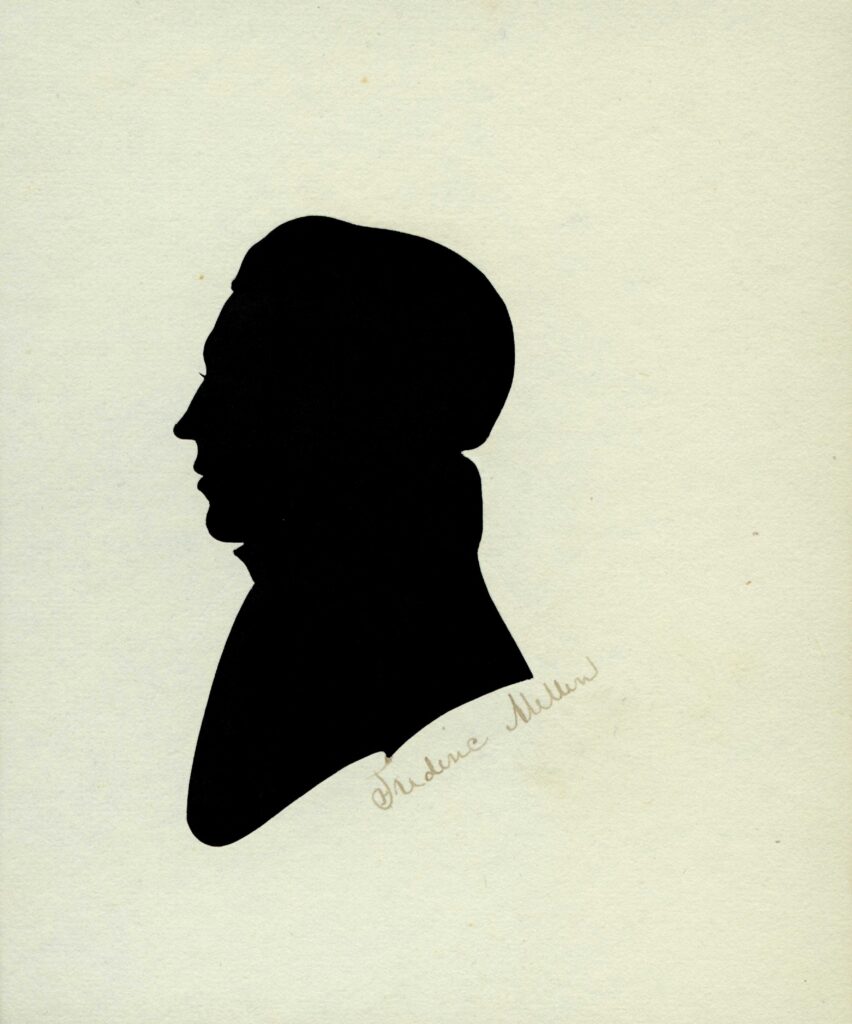
Maine’s First Starving Artist
Frederic Mellen was born in Biddeford, Maine, in 1804. His mother was named Sally Hudson and his father was named Prentiss Mellen. Prentiss was a Massachusetts senator, Maine’s first chief justice, and a Bowdoin trustee starting in 1813. Frederic also had an older brother named Grenville who attended Harvard and became a major literary figure in New York City. Clearly the youngest Mellen had looming shoes to fill. Early in Mellen’s childhood his family moved from Biddeford to Portland. There Frederic became associated with the scions of other Portland elites such as John Dafforne Kinsman, Edward Deering Preble, and the Longfellow brothers. Some sources report that he was particularly close to Henry Wadsworth Longfellow growing up. Mellen developed an early affinity for art. His favorite childhood activity was copying lithographs with a piece of a chewed stick.
Bowdoin admitted Mellen at the age of sixteen, but the boy spent his first year of college studying remotely from Portland. He moved to Brunswick his sophomore year and started boarding at the home of Colonel T. S. Estabrook. Mellen chose to join the Athenean Society rather than its rival the Peucinian society. The scholar was not one of Bowdoin’s main troublemakers, but he received the occasional fine for missing class or prayers. His most notable offense happened in the summer of his sophomore year when he was caught drinking at a tavern with noted miscreants Horatio Bridge, William Hale, and Nathaniel Hawthorne. Mellen spent his junior and senior years living with underclassmen in Winthrop Hall.
Mellen’s passion at Bowdoin was the arts. His favorite academic subject was literature and he soon started writing himself. His creative compositions netted him the title of class poet. Along with poetry, Mellen also took an interest in painting and songwriting. He was a multifaceted artist. Moreover, Mellen’s creative endeavors were matched by his academic work. At the 1825 Class Exhibition he read an original poem entitled, “Home.” He ranked fourteenth at graduation and read another original poem entitled, “The Hour of Parting.”
After graduating, Mellen longed to make art into his career, but was held back by the demands of his family. Prentiss had sent his son to Bowdoin to prepare him for a career in law and did not approve of his artistic dreams. At the time society viewed art as a proper hobby for gentlewoman, but not a respectable profession for a young man. So Mellen was remanded to Portland to study law at his father’s office. He opened his own practice while trying to confine his writing and painting to hobbies. But Mellen could not forget his dreams. He made the choice to leave his father’s shadow and remake himself in Boston as an artist.
Unfortunately for Frederic, he found little success in Massachusetts’ art world. In the 1820’s and 1830’s itinerant painters were considered somewhere between mechanics and thieves in terms of respectability. Moreover, at the time, Boston had comparatively few art patrons. Mellen found most of his work painting portraits and copying famous artworks to be hung in parlors. His one breakthrough was exhibiting his painting, “The Organist,” at the Boston Athenaeum in 1833. Yet, Mellen had little time to revel in his success. He caught tuberculosis, then called the “poet’s disease,” and passed away in 1834. He was just 33.
Mellen left an interesting legacy behind in New England’s art world. After his death, John Neal, who was considered America’s first art critic, wrote Mellen a rather strange obituary. He simultaneously praised the young man as a “genius,” relentlessly criticized his use of color and expressed ambivalence about his potential. In Portland, Mellen was seen as something as a martyr for the arts. He was posthumously published in The Portland Sketchbook and Bowdoin Poets. Mellen also received entries in The Poets of Maine and the New York Historical Society’s Dictionary of Artists of America, the latter of which aptly asserted “Though he failed to become an important painter, Frederic Mellen, deserves to be remembered as a significant trail blazer in the state’s art tradition.”